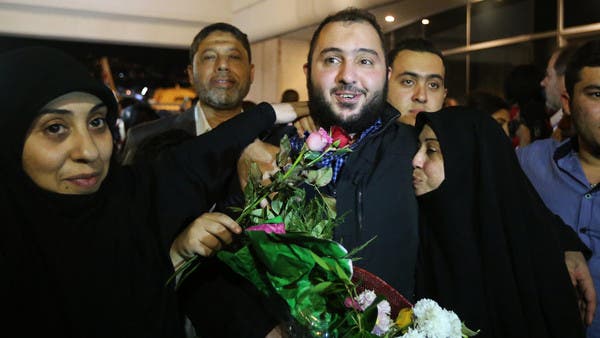Central African Republic & Uganda
- All Africa:Uganda: ICC and Civil Society Want More Action on LRA Atrocities
- Bemba Trial: Bemba Hearings Cancelled Until Next Week
- Bemba Trial: Bemba’s Lawyers Oppose Admission of Untested Witness Statements
Darfur, Sudan
- All Africa: Sudan: President Al-Bashir Arrives in Addis Ababa to Participate in AU Summit on ICC
- Ahram Online: Beleaguered Al-Bashir Arrives in Saudi Arabia for Hajj Pilgrimage
- All Africa: Nigeria: AU Tells ICC to Try African Leaders After Leaving Office
Kenya
- Mail & Guardian Africa’s Best Read: “Kenyan ICC Witnesses Forced to Lie”
- BBC News: Kenya President Kenyatta’s ICC Trial ‘Must Be Scrapped’
- NPR: Kenyan President Faced Justice with Help of Secret Envelope
- Reuters: Kenya’s Ruto To Cooperate with ICC Despite African Pressure
- All Africa: Kenya: ICC Witness 189 Continues Testimony in the Ruto, Sang Case
- All Africa: Kenya: ICC Expects Uhuru Will Attend November 12 Trial
- The Star: “ICC Tried to Trap Barasa”
- Institute for War & Peace Reporting: Kenya Seeks Delay to ICC Trials
Libya
- Global Post: Libyan PM Insists Citizens Must Be Tried in Libya
- ICC Press Release: ICC Pre-Trial Chamber I Decides that the Al-Senussi Case Is to Proceed in Libya and Is Inadmissible Before the ICC
- BBC News: Gaddafi-Era Spy Chief al-Senussi To be Tried in Libya
- The Daily Star: ICC Defers Gadhafi Aide Trial to Libya in Historic First
- The Tripoli Post: ICC: Libya Is Fit to Hold Trials of Crimes Under International Law
Cote d’Ivoire (Ivory Coast)
Africa
International Criminal Tribunal for Rwanda
- All Africa: Transferred Genocide Suspects Say They Don’t Understand Their Own Language
- Globalpost:R wanda’s Kagame Slams “Selective” Justice by ICC
Europe
Court of Bosnia & Herzegovina, War Crimes Chamber
- Court of Bosnia & Herzegovina: Trial Verdict Confirmed in Relation to Saša Zecevic
- Court of Bosnia & Herzegovina: Criminal Proceedings in the Case v. Goran and Zoran Damjanovic Reopened
- Court of Bosnia & Herzegovina: Plea Hearing in the Case v. Aleksandar Cvetkovic
- Court of Bosnia & Herzegovina: Criminal Proceedings in the Case v. Abduladhim Maktouf Reopened
- Court of Bosnia & Herzegovina: Aleksandar Cvetkovic Enters a Not Guilty Plea
- Court of Bosnia & Herzegovina: Suspension of Sentence in the Case of Goran and Zoran Damjanovic
International Criminal Tribunal for the Former Yugoslavia
- Institute for War and Peace Reporting: Witness Decides Sexual Torture by Bosnia Serb Forces
- Institute for War and Peace Reporting: Panel to Investigate Possible Del Ponte Contempt
- Institute for War and Peace Reporting: Decision to Disqualify Seselj Judge Upheld
- Institute for War and Peace Reporting: Karadzic Interview Request Denied
Domestic Prosecutions in the Former Yugoslavia
- Balkan Insight: War Crimes Retrial for Three Kosovo Serbs
- Balkan Insight: Bosnian Serb’s Zvornik War Crimes Acquittal Upheld
Middle East and Asia
Extraordinary Chambers in the Courts of Cambodia
- The Phnom Penh Post: Premier Seeks KRT Aid From US
- The Cambodia Daily: Female Victims of KR Regime Given a Voice
- The Cambodia Daily: Government Pledges to Meet $1.8M Khmer Rouge Tribunal Shortfall
- The Cambodia Daily: KR Tribunal to Hear Closing Statements in First ‘Mini-Trial’
- The Phnom Penh Post: Tribunal Eyes Future Beyond Case 002/01
- VOA Khmer: Khmer Rouge Victims Urge Tribunal to Consider Reparations
- VOA Khmer: Tribunal Defendants Created a ‘Slave State,’ Prosecutor Says
- The Phnom Penh Post: Victims in Limelight on Day of ‘Justice’
Syria
- ABC News: Rights Group Accuses Syrian Rebels of War Crimes
- CBS News: Human Rights Watch: Jihadi-led Syrian Rebels Committed War Crimes
- CNN: Syria: Red Cross, Red Crescent Workers Kidnapped; 2 Bombs Rock Capital
- Middle East Online: Syrian War Crimes Tribunal in the Making
Special Tribunal for Lebanon
- Naharnet: Safadi Urges Miqati to ‘Exceptionally’ Approve Funding of STL in Installments
- The Daily Star: Top Officials Commit to STL Funding
- Naharnet: STL Indicts Fifth ‘Hizbullah Supporter’ in Hariri Assassination
- Naharnet: STL Asks Lebanese Authorities to Publish Merhi’s Posters in the Media
- The Daily Star: Lawyers for STL Suspect Seek Trial Suspension
Bangladesh International Crimes Tribunal
- Bangladesh News 24: ICT Staff Held over Draft Verdict Leak
- The Telegraph: Bangladesh’s Former Opposition Minister Sentenced to Life for War Crimes
War Crimes Investigations in Burma
- Associated Press: Muslim Victims: Myanmar Police May Have Unwittingly Aided Buddhist Attackers
- Associated Press: Myanmar Arrests 44 Suspects After Buddhist-Led Attacks in Thandwe
North and South America
United States
- Associated Press: Are Some Guantánamo Prisoners Too Sick to Keep Locked Up?
- The Washington Post: Guantanamo Bay Prison Camp Still at Work on Its Image
- The Washington Post: Documents Reveal NSA’s Extensive Involvement in Targeted Killing Program
- The New York Times: Door May Open for Challenge to Secret Wiretaps
South & Central America
Argentina
Columbia
- Associated Press: Impunity Feared in Colombia Military Justice Law
- MercoPress: Colombia Peace Talks Stalled: Government Concerned with Slow Pace of Negotiation
- Colombia Reports: ELN Peace Team is ‘Formed and Ready’, Waiting for Colombian Government: Central Command
Guatemala
Peru
Topics
Terrorism
- CBS News: Former Federal Prosecutor: Al-Libi Capture “A Significant Accomplishment”
- The New York Times: U.S. Said to Hold Qaeda Suspect on Navy Ship
- The Wall Street Journal: New Yorkers Charged with Aiding Taliban
- By Sari Horwitz: Libyan Terrorism Suspect Appears in Federal Court in Manhattan, Pleads Not Guilty
- Hurriyet Daily News: Greece to Lift Immunity on Golden Dawn MPs
- Sky News: Terrorism Charges After Two Stopped at Dover
- Dawn.com: Anti-Terrorism Court Convicts HuT Activist
Piracy
- Defense News: EU May Help Somalia Establish Coast Guard to Combat Piracy
- RTTNews: Ukraine Joins NATO Anti-Piracy Mission off Somalia
- Deccan Chronicle: Counter-Piracy Ship Crew Booked for Carrying Arms
- Strategy Page: Pirates Wait for Cost Cutting to Start
- Gulf News: Oman Plays Key Role in Solving Piracy Problem
- Business Insurance: Growing Piracy Risk in West African Waters Brings New Exposures, Challenges
- The Star Online: Pirates Enjoying Prison Life
Gender-Based Violence
- The New Indian Express: Israel’s Ex-President Seeks Retrial in Rape Case
- AllAfrica: Tanzania: The FGM Monster Still Rears Its Ugly Head
- Hindustan Times: Court Awards Death Sentence to Rapist-Killer of Dhanbad Minor Girl
- The Times of India:Shakti Mills Gang-Rape Case: Draft Charges Submitted
- BBC: Delhi Gang Rape: Four Convicted Men to Appeal
- BBC: UN’s Minusma Troops “Sexually Assaulted Mali Woman”
- Jamaica Information Service: Gov’t Reviews Draft Action Plan to Eliminate Gender-Based Violence
Reports
UN Reports
- UN News Centre: ICC Urges Security Council Support to Enforce Decisions
- Tribune: War Crimes: Charles Taylor Secretly Sent to UK Jail
- Las Vegas Sun: Sudan Leader Set to Address UN Despite Indictment
- Digital Journal: UN Chemical Weapons Team Back in Syria to Investigate War Crimes
- UN News Centre: Upholding of Charles Taylor Conviction ‘Important Step’ for Justice- Security Council
- USA Today: Experts Push for Syrian War Crimes Court
NGO Reports
Truth and Reconciliation Commissions
Tunisia
Solomon Islands
Brazil
South Sudan
Nigeria
Commentary and Perspectives
- Opinio Juris: PTC I’s Inconsistent Approach to Complementarity and the Right to Counsel
- Justice in Conflict: On the Eve of the AU Summit: How the ICC is Being Defended
- Opinio Juris: Libya’s Magic Security Situation and al-Senussi’s Right to Counsel
- Lawfare: Charles Taylor Goes to Jail in Britain: The Backstory
Worth Reading
- Utrecht Law Review: The Prerequisite of Personal Guilt and the Duty to Know the Law in the Light of Article 32 ICC Statute
- By Kenneth Williams: Justice or Peace? A Proposal for Resolving the Dilemma
- CEU Political Science Journal: National Heroes vs. EU Benefits: Croatia and the EU Conditionality
- Journal of International Criminal Justice: Charles Taylor’s Criminal Responsibility


